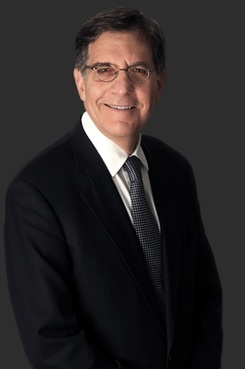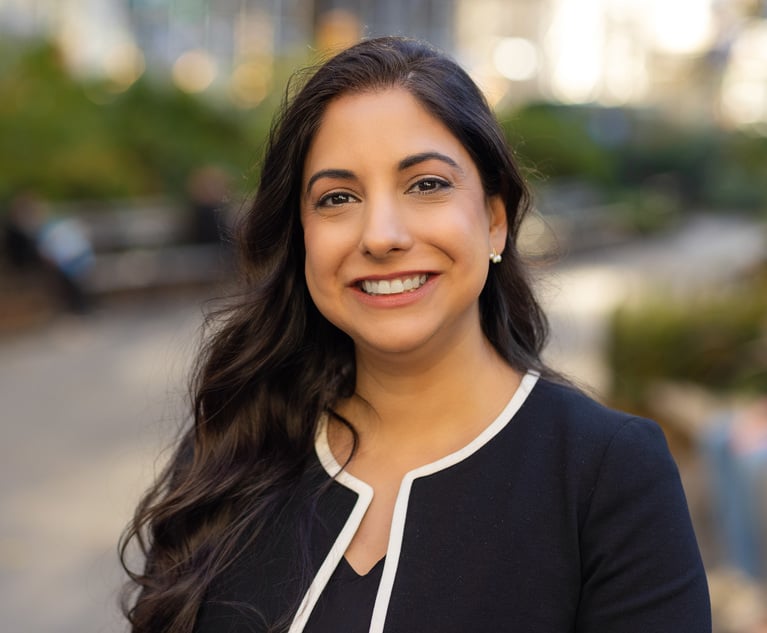Reed Smith Lands Litigation Trio From Greenberg Traurig
Greenberg Traurig litigation partners Louis Solomon, Colin Underwood and Michael Lazaroff are joining Reed Smith in New York as the firm looks to expand its footprint in complex and international litigation.
January 18, 2018 at 07:00 AM
5 minute read

Less than two years after leaving Cadwalader, Wickersham & Taft for Greenberg Traurig, a high-powered team of litigators is on the move again in New York.
Louis Solomon, a former co-chair of the litigation group at Cadwalader, is leaving Greenberg Traurig with fellow partners Colin Underwood and Michael Lazaroff to join Reed Smith's New York office as the latter looks to expand its litigation practice in the city.
Solomon, who served as global co-head of Greenberg Traurig's international litigation group, will now head that practice at Reed Smith. Lazaroff and Underwood will continue to work with Solomon as partners in Reed Smith's complex litigation group.
“[Solomon] is a trial lawyer and his team is a team of trial lawyers,” said Peter Ellis, chair of Reed Smith's complex litigation group. “At Reed Smith, we have a strong stable of trial lawyers and bringing [Solomon] and the rest of the team helps build on that tradition.”
The three partners have practiced together for more than 20 years, handling various matters, including extensive and diverse trial work in the international litigation and arbitration arena, as well as class actions for clients around the globe.
Solomon, Underwood and Lazaroff first made headlines in 2010 when they, along with current Greenberg Traurig partner Hal Shaftel, joined Cadwalader from Proskauer Rose, where Solomon co-chaired Proskauer's litigation department. That lateral move saw Solomon become co-head of the litigation group at Cadwalader and chair of its commercial and international litigation teams.
But in early 2016, all four partners, including Shaftel, left Cadwalader for Greenberg Traurig in an effort to build out that firm's New York litigation group. (Greenberg Traurig is no stranger to hiring top partners from Cadwalader, having in 2011 recruited M&A rainmaker Dennis Block, the current senior chairman of the firm's global M&A practice.)

“I would call it a step,” said Solomon of his group's decision to Reed Smith. “I think it's the next and, I think, last move for us in an evolution of both our practice and maybe even our personalities.”
And a part of that evolution has been an increased focus on international matters for clients, Solomon said.
“The world is getting smaller,” added Solomon, who also operates a legal practice blog titled “OneWorld International” that discusses topics and trends in international litigation.
One of the main reasons that Solomon, Underwood and Lazaroff decided to join Reed Smith was because of the firm's strategic commitment to become a top 20 global firm, Solomon said.
“[Reed Smith] not only has the will to do that but they execute on it [through] the way they treat people and the culture they have,” said Solomon about his new firm, whose presence in the U.K. and elsewhere abroad was bolstered via its 2006 merger with British firm Richards Butler.
Reed Smith, with 1,536 lawyers, currently ranks No. 32 in The American Lawyer's most recent Global 100 rankings when measured by gross revenue, a number that stood at $1.075 billion for Reed Smith in 2016. Reed Smith's largest office is in London, an outpost that has reportedly been exploring the possibility of adopting an alternative business structure in the U.K. (Greenberg Traurig, for its part, comes in a No. 19 in the Global 100 rankings thanks to its roughly $1.4 billion in gross revenue for 2016.)
Reed Smith's recruitment of Solomon, Underwood and Lazaroff was brokered by Samuel Roberts, the national executive director at New York-based legal search firm Mestel & Co., which also arranged the group's exit from Cadwalader in 2016.
“For us, it's really the high-end capability of the team—their ability to handle complex and important pieces of litigation and the international element, which is [part] of what we're trying to do as a firm in all areas of practice, including litigation,” said Michael Pollack, managing partner for the Americas at Reed Smith. “We've worked hard this past year to enhance our international dispute resolution capabilities.”
Pollack noted that last year Reed Smith sought to increase its international dispute resolution capabilities with several key lateral hires.
In April, the firm opened an office in Miami after bolting on a seven-lawyer international arbitration practice from local boutique Astigarraga Davis. The firm also picked up Pinsent Masons partner Peter Rosher in Paris to serve as its head of international arbitration.
And Reed Smith isn't ready to stop hiring. Pollack said his firm is looking to add to its talent roster, capture more opportunities from existing clients and expand its client base and market share in an increasingly competitive legal marketplace. Reed Smith started off 2018 by snagging four laterals to grow its office in Houston, one the firm opened in 2013.
This content has been archived. It is available through our partners, LexisNexis® and Bloomberg Law.
To view this content, please continue to their sites.
Not a Lexis Subscriber?
Subscribe Now
Not a Bloomberg Law Subscriber?
Subscribe Now
NOT FOR REPRINT
© 2025 ALM Global, LLC, All Rights Reserved. Request academic re-use from www.copyright.com. All other uses, submit a request to [email protected]. For more information visit Asset & Logo Licensing.
You Might Like
View All

Family Law Practitioners Weigh In on Court System's New Joint Divorce Program

Former NY City Hall Official Tied to Adams Corruption Probe to Plead Guilty

New Charges Expected in Sex Trafficking Case Against Broker Brothers
Trending Stories
- 1'Shame on Us': Lawyer Hits Hard After Judge's Suicide
- 2Upholding the Integrity of the Rule of Law Amid Trump 2.0
- 3Connecticut Movers: New Laterals, Expanding Teams
- 4Eliminating Judicial Exceptions: The Promise of the Patent Eligibility Restoration Act
- 5AI in Legal: Disruptive Potential and Practical Realities
Who Got The Work
J. Brugh Lower of Gibbons has entered an appearance for industrial equipment supplier Devco Corporation in a pending trademark infringement lawsuit. The suit, accusing the defendant of selling knock-off Graco products, was filed Dec. 18 in New Jersey District Court by Rivkin Radler on behalf of Graco Inc. and Graco Minnesota. The case, assigned to U.S. District Judge Zahid N. Quraishi, is 3:24-cv-11294, Graco Inc. et al v. Devco Corporation.
Who Got The Work
Rebecca Maller-Stein and Kent A. Yalowitz of Arnold & Porter Kaye Scholer have entered their appearances for Hanaco Venture Capital and its executives, Lior Prosor and David Frankel, in a pending securities lawsuit. The action, filed on Dec. 24 in New York Southern District Court by Zell, Aron & Co. on behalf of Goldeneye Advisors, accuses the defendants of negligently and fraudulently managing the plaintiff's $1 million investment. The case, assigned to U.S. District Judge Vernon S. Broderick, is 1:24-cv-09918, Goldeneye Advisors, LLC v. Hanaco Venture Capital, Ltd. et al.
Who Got The Work
Attorneys from A&O Shearman has stepped in as defense counsel for Toronto-Dominion Bank and other defendants in a pending securities class action. The suit, filed Dec. 11 in New York Southern District Court by Bleichmar Fonti & Auld, accuses the defendants of concealing the bank's 'pervasive' deficiencies in regards to its compliance with the Bank Secrecy Act and the quality of its anti-money laundering controls. The case, assigned to U.S. District Judge Arun Subramanian, is 1:24-cv-09445, Gonzalez v. The Toronto-Dominion Bank et al.
Who Got The Work
Crown Castle International, a Pennsylvania company providing shared communications infrastructure, has turned to Luke D. Wolf of Gordon Rees Scully Mansukhani to fend off a pending breach-of-contract lawsuit. The court action, filed Nov. 25 in Michigan Eastern District Court by Hooper Hathaway PC on behalf of The Town Residences LLC, accuses Crown Castle of failing to transfer approximately $30,000 in utility payments from T-Mobile in breach of a roof-top lease and assignment agreement. The case, assigned to U.S. District Judge Susan K. Declercq, is 2:24-cv-13131, The Town Residences LLC v. T-Mobile US, Inc. et al.
Who Got The Work
Wilfred P. Coronato and Daniel M. Schwartz of McCarter & English have stepped in as defense counsel to Electrolux Home Products Inc. in a pending product liability lawsuit. The court action, filed Nov. 26 in New York Eastern District Court by Poulos Lopiccolo PC and Nagel Rice LLP on behalf of David Stern, alleges that the defendant's refrigerators’ drawers and shelving repeatedly break and fall apart within months after purchase. The case, assigned to U.S. District Judge Joan M. Azrack, is 2:24-cv-08204, Stern v. Electrolux Home Products, Inc.
Featured Firms
Law Offices of Gary Martin Hays & Associates, P.C.
(470) 294-1674
Law Offices of Mark E. Salomone
(857) 444-6468
Smith & Hassler
(713) 739-1250






